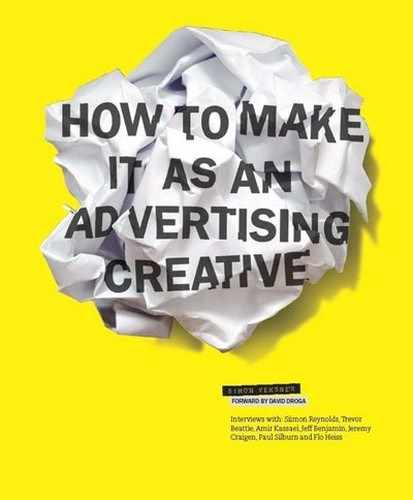
EXECUTIVE CREATIVE DIRECTOR
SAATCHI & SAATCHI, LONDON, ENGLAND
If you’ve got the ability you just need tons and tons of luck.
I didn’t go to college or university. I left school because SI hated it and didn’t know what I wanted to do with myself for some time. I hated being told what to do, and if I’m honest I still do. I had a few pointless day jobs while trying to get into record companies and doing some DJing. The only things I was half good at while at school were messing about and writing, so eventually I decided to try and use them in some way but didn’t consider advertising at first. I learned how to put a book together by seeing creatives in agencies. It took ages because I was so naïve. I suppose what I learnt from this is that I should have gone to college.
In theory, anyone should now be able to work anywhere, but it really depends on the circumstances, culture, and politics of each agency at the time. That’s true whether you’re simply changing from getting off the tube at a different stop in London or moving thousands of miles to a different country.
Ummm…not really.
Write them a great script.
There’s no doubt some creatives excel in certain areas. I don’t know why that is, but does it matter? If it does it’s a bit like expecting a brilliant striker to also be a great goalkeeper.
I’m not impressed by scam. I used to admire the fact that some creatives would go out and do stuff on their own initiative, but it’s become a complete joke now. What staggers me is that some very senior people have made a fortune and got some very highly paid and important positions on the back of this kind of work; that makes me disillusioned at times.
They’re obviously crucial to the senior people I referred to above. My view is that it’s nice to be recognized for doing something that people love—but it means most to me if it’s working and loved by the public too. I like winning awards, but forget it the day after the ceremony and get on with the next project. I’m not into putting the gross-looking things on shelves to show off how many I have. In fact, I shipped all my awards in boxes to the US and back to the UK without ever unpacking them and realized I never would. So I took the lot (minus the D&AD pencils my wife made me keep and a Cannes Lion, which we use as a doorstop in our living room) and dumped them at the local council tip.
I think you really have to love what you do to get the best out of yourself and from the industry. But that doesn’t mean you can’t have outside interests like music, art galleries, movies, TV, books…and surfing YouTube.

GETTING THE RIGHT FINANCING AND LEGAL ADVICE
“The finance and legal stuff is tedious and tiresome,” says Jo Tanner. “Don’t let enthusiasm carry you away. Don’t say you’ll do the VAT returns unless you absolutely mean it. Better to pay someone who actually likes doing that stuff.”
“Know that being a creative has nothing to do with running an agency,” says Alexandre Gama. “Very different skills. So, unless you have both abilities (rare), never try a creative approach with the finance department, for instance. Have a very, very conservative policy there.”
“This is a steep learning curve,” says Owen Lee. “It’s invaluable to have a business person on your team that you trust (usually the finance director). It’s not just creatives; I think account people and planners also come to the crushing realization that we know how to create advertising but we haven’t got a clue how the business runs. But you learn. Usually by mistakes. The learning curve gets even steeper when you eventually sell the company.”
The importance of sound legal and business advice is underlined by Mark Denton. “I got kicked out of my own agency, despite having won a ton of awards,” he recounts.
“Creatives must protect themselves,” says Ben Kay. “Make sure you can’t be voted out by your partners. Set up a system whereby unanimous decisions are needed for such important occurrences.”
WHAT TYPES OF BUSINESS TO PITCH FOR AND THE ONES TO AVOID
“At first you think the phone will never ring,” says Ben Priest. “You fear your wife and kids will starve, and you want to go for everything. But very, very quickly you realize—for your soul and sanity—you have to be selective. It’s really a people thing—do you like the clients, can you imagine spending time with them trying to hammer out something brilliant?”
“At the beginning, you are so hungry to prove yourself that you end up chasing every ball like a six-year-old playing football,” admits Owen Lee. “We’ve all chased ridiculous pitches.”
“You learn. You will develop antennae for time-wasters and something-for-nothingers,” says Jo Tanner. “There are a lot out there.” “We did letterheads at the beginning,” confesses Dave Dye. “We did anything. But we always tried to make it good – we never did big logos and dumbed-down work. A lot of start-ups focus on winning tons of business first, and then make the work better later. In a way, I don’t criticize that attitude. You can’t improve the creative work if you don’t exist.”
“When it’s your own business, you naturally become more responsible,” he explains. “You don’t tell a client ‘I absolutely have to have a one-legged man in this commercial, or it doesn’t work.’ You’re a bit more sensible. You become thoughtful about what the client really needs, not just what you want to do for them.”
“Nothing goes the way you think it will,” warns Dave Dye, finally.
“It’s like jumping in a fast-flowing river—you just have to move and react. But I could never go back to a big agency now.”
